Cleaning Solar Panels: Tips for Maintaining Your System
As solar panels continue to grow in popularity, it’s crucial for owners to understand the importance of proper maintenance and cleaning. Over time, dust, dirt, and other debris can accumulate on solar panels and reduce efficiency. Regularly cleaning your solar panels can extend the lifespan of your system and ensure it’s working at full capacity. Below we’ll discuss how to clean solar panels yourself, when to call an expert, and popular methods for maintaining solar systems.
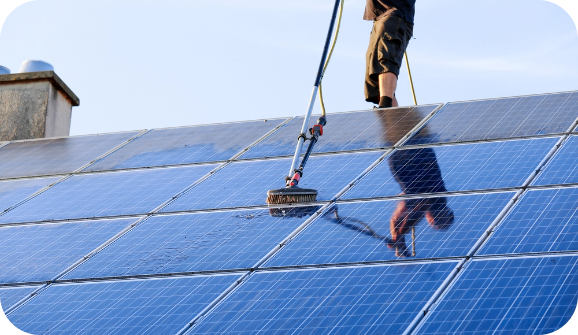
How Do Location and Angle Affect Solar Panel Cleaning?
Location and panel angle can affect how often you need to clean your solar panels. Where you live can impact the amount of dirt, debris, and pollutants that build up on your panels. For example, if you live in an urban or dusty area, dirt may build up easier on your panels, and you may need to clean your panels more regularly.
Panel angle can affect how water and debris run off the panel’s surface. If the angle is too flat, debris may not slide off, and water may pool on the surface. This can lead to more build-up that requires frequent cleaning. You can speak with your solar installer to discuss how often you should clean your panels based on where you live.
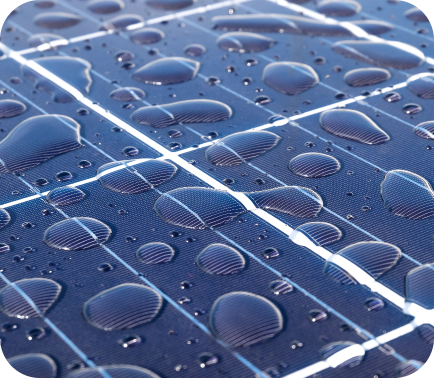
Work with a Professional for Complex Cleanings
Working with a professional for complex solar panel cleanings is recommended because these cleanings may require specialized tools, equipment, and expertise that a homeowner may not have. Difficult cleanings may include hard-to-reach areas, heavily soiled panels, or addressing specific issues that require professional attention.
Professional cleaners have experience working with various solar systems that can adequately assess the condition of your panels to determine the best course of action. They also have the necessary equipment, such as high-pressure washers or specialized cleaning solutions, to safely and effectively clean your panels without causing damage.
Working with a professional can also help prevent accidents or injuries when attempting to clean solar panels on your own. Climbing on a roof or reaching high panels can be dangerous, and professional cleaners have the proper training and safety equipment to prevent accidents.
Safety Guidelines
If you’re going to wash your solar panels yourself, there are a few things to know to keep yourself and your panels safe. Here’s how to clean solar panels safely.
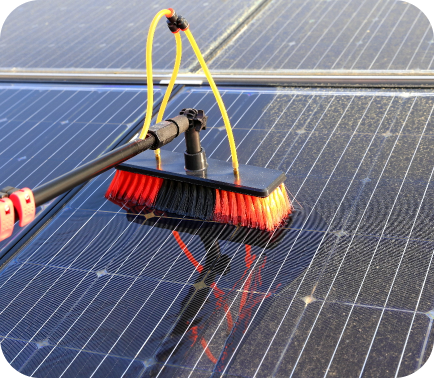
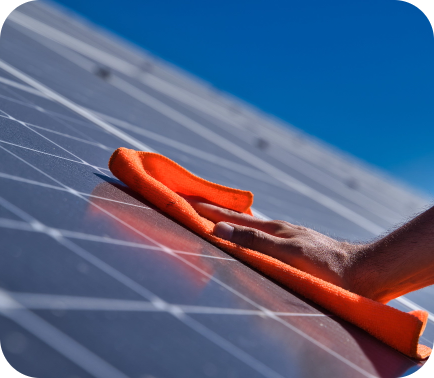
Solar Panel Cleaning Tips
While regular cleaning is important, using the right tools and techniques is essential to avoid damaging your panels. Here are some tips for cleaning your panels efficiently.
DIY Solar Panel Cleaning
You can make your own solution for cleaning solar panels by mixing a quarter cup of mild detergent, such as dish soap or laundry detergent, with every gallon of water. Make sure to use a mild detergent to avoid damaging the panels. Mix the solution in a bucket and use a soft sponge or gentle brush to apply it to the panels. After applying the solution, rinse the panels thoroughly with a garden hose to remove any residue.
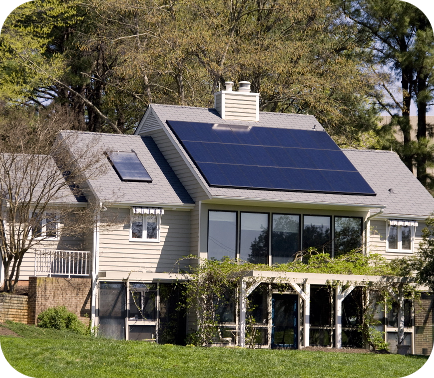
Bird Droppings
Bird droppings can significantly reduce your solar panels’ performance, even more than dirt build-up. They create shade over a panel’s surface, blocking sunlight from reaching the cells and reducing efficiency. Bird droppings are also acidic and can cause corrosion and damage your panels permanently. Because of this, it’s important to clean bird droppings off your solar panels as soon as possible to ensure optimal performance and prolong your system’s lifespan.
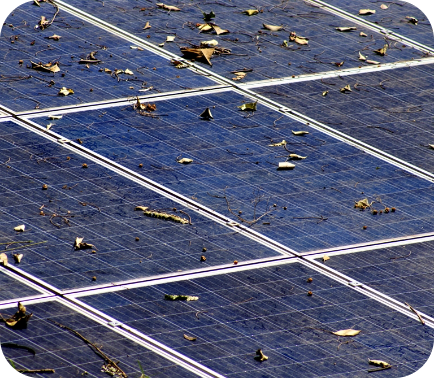
When Should I Contact a Cleaning Expert?
You can contact an expert anytime if you don’t feel comfortable cleaning your panels yourself. However, here are some times when contacting an expert is best.
Tips for Keeping Solar Panels Efficient
Cleaning your solar panels is a great way to keep your home solar system working efficiently. However, there are some additional ways to maintain your solar panels and ensure they work efficiently. These include:
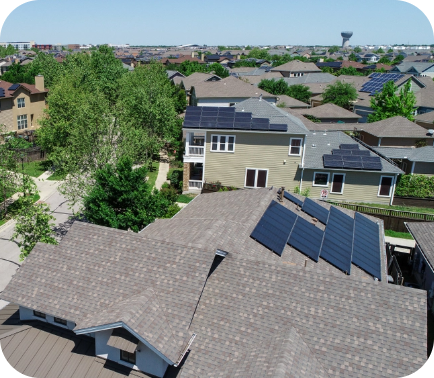
Methods for Cleaning Your Solar Panels
There are several methods for cleaning solar panels besides manual cleaning with a brush. Some involve specialized tools or equipment, while others use common household items. Here are some different solar panel cleaning methods you may be able to try.
Water
Water is the most common way to clean solar panels. As mentioned above, you can use a garden hose to remove most dirt and debris from your panels. For more challenging spots, some professional cleaners use power wash systems. These systems use a high-pressure water spray to remove tough dirt, bird droppings, and other stubborn stains that won’t come off with a soft brush or garden hose.
Vibration
Vibration is a relatively new cleaning method and doesn’t involve water. A motor is attached to the back of a solar panel, creating tiny shockwaves to dislodge dirt. This method is great for removing both light and heavy debris, such as bird droppings.
Robotic Cleaners
Robotic cleaners can automatically remove dirt and debris from solar panels. These cleaners use soft brushes or water jets to clean the panels without damaging them. You can program robotic cleaners to clean at regular intervals, reducing the need to clean solar panels manually.
Work with Axia Solar
If you’re looking for a reliable and experienced solar company, Axia Solar can help. With our decades of experience, we can help you design, install, and maintain your solar system. We use high-quality panels and materials to ensure your system lasts. Contact us today to learn more about our solar services!